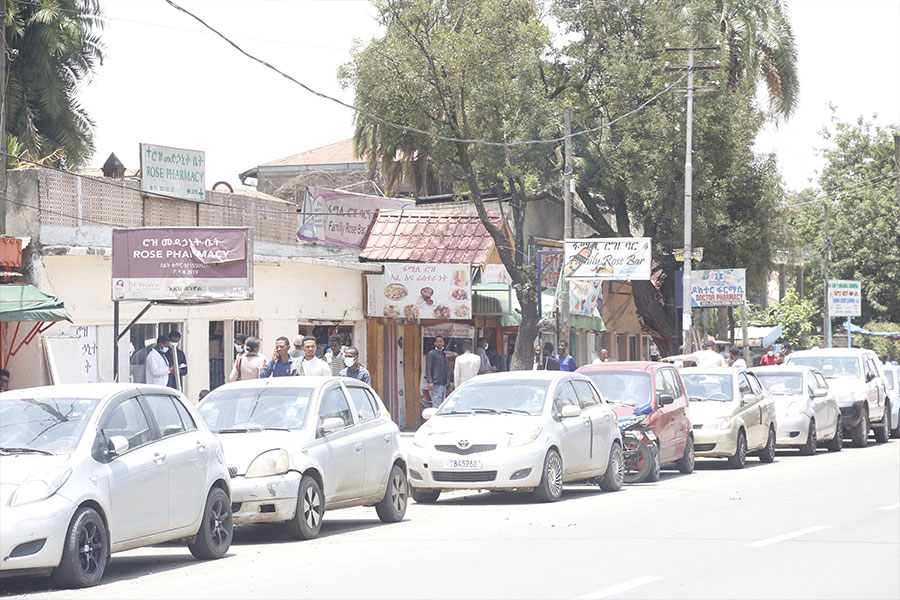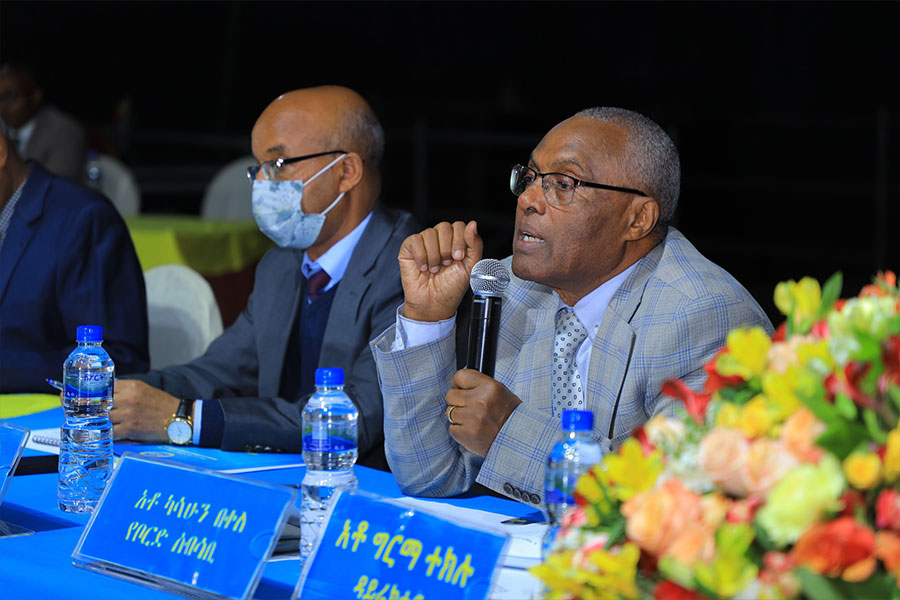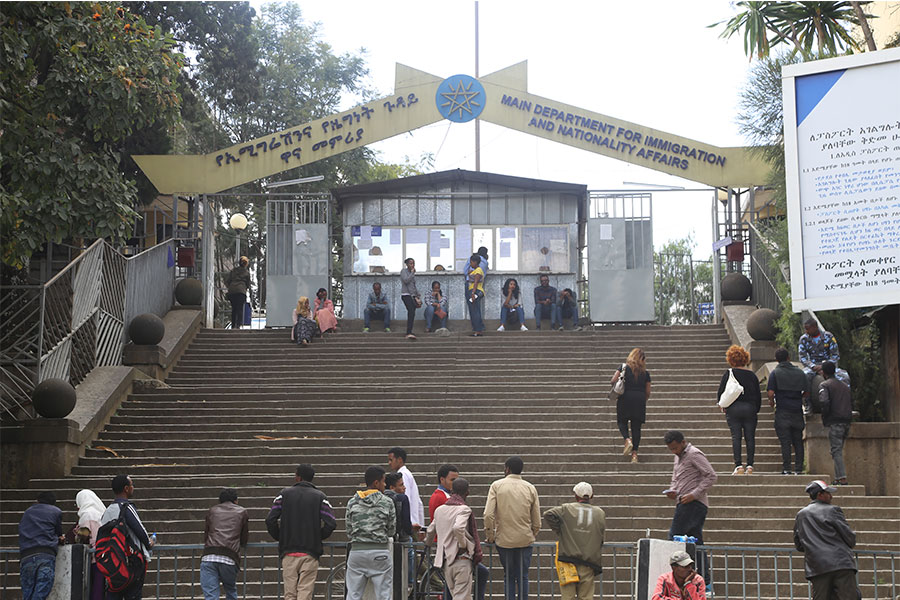
Fortune News | Jan 19,2024
Samson Mekonnen, born and raised in the Ras Desta Hospital area of Arada District and a graduate of General Wingate TVET College in carpentry, is now in his 30s.
For years he worked on various temporary jobs but was hard-pressed to land permanent employment.
Struggling to support himself and contribute to the family, he registered at his weredaas an unemployed person hoping to find opportunities through state support.
The call came two and a half months ago. He was told that although no financial support was forthcoming, it was possible to apply for a scheme that awarded lots for shops through a drawing.
After filling out forms, giving fingerprints and presenting witnesses who testified that he was currently unemployed, he registered and was lucky enough to be allotted a space where he can set up a small business.
“The space that was allotted to me might have been a dumping ground and full of garbage, but I was excited to get it," said Samson. “I felt like a chance to turn my luck around.”
Unable to find access to credit, he borrowed money from family and friends. He managed to set up a metal shop on the empty lot.
Since there were colleges and schools close by, he thought it would be wise to sell stationery materials and spent 6,000 Br buying his supplies.
Only a few structures remain after the demolition of the street sheds began in front of the old train station in Leghar.
But Samson was not the only one to receive that call after registering with the wereda.
The past month saw several small street shops pop up in different areas of the city including the Arada, Qirqos, Bole and Aqaqi Qality districts. Some were built from lumber and plastic sheeting, while others were constructed from sturdier material like Samson’s shop.
The shops drew the attention of media and the public as well, who blamed them for turning the city into a shanty town. Sanitation facilities were not provided either, raising the concerns of many residents of the city.
This was followed by a surprising statement issued by city officials who claimed the structures were built without the knowledge of the City Administration and have to be demolished.
Officials at the City Council said that the sheds are an unfortunate result of a misguided effort to create job opportunities through a scheme to formalise street traders in the city.
A year and a half ago, the Addis Abeba City Administration's Trade & Industry Bureau introduced directives that offer individuals operating in the informal sector a path toward formalisation by providing them with stalls to conduct their trade.
“The directive was aimed at generating revenue, regulating the sector and creating a system for the many informal traders that lived a life of uncertainty and instability,” said Zerihun Assefawu, a higher officer of informal trade transition and regulation at Arada District.
To receive the spaces, traders with capital below 10,000 Br had to register, present identification cards from their respective weredas, prove that they work as street vendors and pay a 70 Br fee.
They then receive a taxpayer identification number (TIN) and a badge to wear at all times while working in the marketplaces once they were allotted a space through a drawing.
With 158 spaces across the city identified for use as marketplaces, and allotments planned to be rotated every two years, the Bureau registered close to 57,000 traders, almost a fifth of which were assigned lots.
“We gave the street vendors training and communicated with them in how they will operate,” said Zerihun. “We stressed that construction was not allowed.”
A few months ago during meetings that involved the highest city officials and the youth of the city, an understanding was reached to use available free spaces in the city for job creation, according to sources in the administration.
Through the Job Creation & Food Security Agency, unemployed youth that registered at their respective weredas were contacted and awarded the spaces.
Some of the unemployed allotted space had paid 70 Br to register and were given commercial space for a period of two years.
While officials at the weredaoffices of the city’s Job Creation Agency offices admit that they organised and awarded the spaces, higher officials denied any involvement.
“No order was passed from the Agency that authorised the weredaoffices to give away any spaces,” says Jemal Jember, head of the Agency.
With no one willing to take responsibility for the decision, a meeting was held last week between the city, district and council officials and a decision was passed to demolish the stalls.
Ali Yibre (PhD), a lecturer at the College of Business & Economics of Bahir Dar University, believes that the problem arises as a result of bureaucratic hurdles and a lack of accountability and study-based decision making.
“The city should have put in place a different scheme based on studies and research to address the problem of the unemployed in providing access to facilities,” he says, adding that the confusion will make it hard for residents to put trust in their city administration and government.
Some weredashad already started taking down the sheds, including in Qirqos where small traders were busy constructing and settling in the middle of the road islands near the old train station in Leghar.
But there are some exceptions. Lucky for Samson, his weredahas refused to take down the street stalls.
“We were the ones who called these people from their home, gave them space and told them they could run a small shop if they could get the initial investment,” said a weredaofficial who preferred to remain anonymous.
“I would rather leave my post than order the demolition of the sheds and dash the hope of these youth through no fault of their own.”
Samson, however, is little reassured by the decision of his weredaand doubts the future of his stall.
“I don’t know what will happen when the district officials get involved,” he says. “If they destroy my shop, this is it for me.”
PUBLISHED ON
Feb 16,2019 [ VOL
19 , NO
981]

Fortune News | Jan 19,2024

Agenda | Aug 14,2021

News Analysis | Mar 16,2024

Fortune News | Jun 01,2019

Viewpoints | Jan 05,2019

Radar | Oct 23,2023

My Opinion | Jun 14,2025

Fortune News | Sep 21,2025

My Opinion | May 23,2021

Radar | Sep 07,2025

Dec 22 , 2024 . By TIZITA SHEWAFERAW
Charged with transforming colossal state-owned enterprises into modern and competitiv...

Aug 18 , 2024 . By AKSAH ITALO
Although predictable Yonas Zerihun's job in the ride-hailing service is not immune to...

Jul 28 , 2024 . By TIZITA SHEWAFERAW
Unhabitual, perhaps too many, Samuel Gebreyohannes, 38, used to occasionally enjoy a couple of beers at breakfast. However, he recently swit...

Jul 13 , 2024 . By AKSAH ITALO
Investors who rely on tractors, trucks, and field vehicles for commuting, transporting commodities, and f...

Oct 18 , 2025
The political establishment, notably the ruling party and its top brass, has become p...

Oct 11 , 2025
Ladislas Farago, a roving Associated Press (AP) correspondent, arrived in Ethiopia in...

Oct 4 , 2025
Eyob Tekalegn (PhD) had been in the Governor's chair for only weeks when, on Septembe...

Sep 27 , 2025
Four years into an experiment with “shock therapy” in education, the national moo...